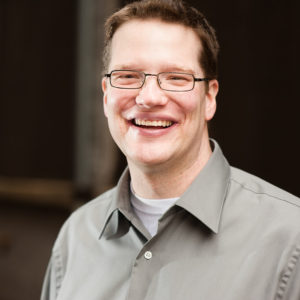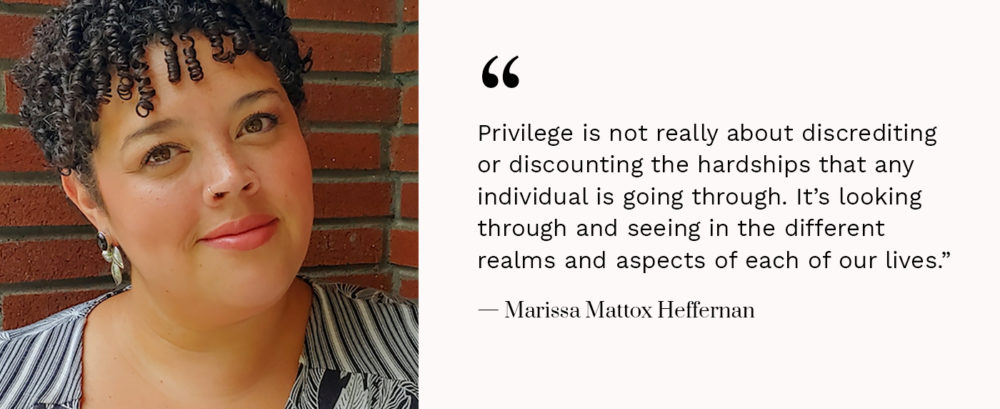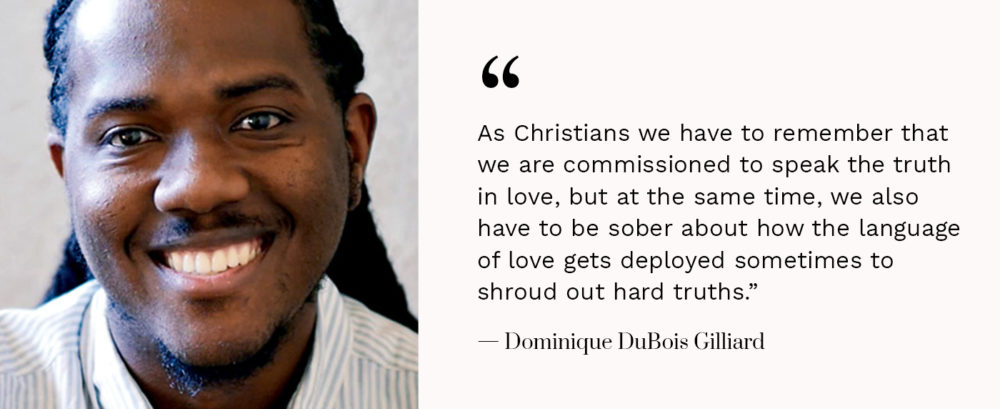A Light+Life Podcast
With guests Marissa Mattox Heffernan and Dominique DuBois Gilliard
Hosted by Brett Heintzman

Jeff Finley
Light + Life Executive Editor
Jeff Finley is this magazine’s executive editor. He joined the Light+Life team in 2011 after a dozen years of reporting and editing for Sun-Times Media. He is a member of John Wesley Free Methodist Church where his wife, Jen, serves as the lead pastor.
by Jeff Finley
These are some of the topics discussed during a new episode of the Light + Life Podcast in which host Brett Heintzman interviews Marissa Mattox Heffernan — the associate pastor of discipleship at New Hope Free Methodist Church in Rochester, New York, and the director of the Genesis Justice Network — and Dominique DuBois Gilliard, the director of racial righteousness and reconciliation for the Evangelical Covenant Church and the author of the forthcoming book “Subversive Witness: Scripture’s Call to Leverage Privilege,” which Zondervan will release Aug. 24. Gilliard will be a keynote speaker at the Justice Network Summit that will be held Sept. 9–11 at Iglesia Nueva Vida in Cleveland, Ohio. The first 100 registrants will receive a complimentary copy of the book.
Gilliard said his job title “is a fancy way of saying I am a pastor to pastors” by helping “congregations throughout North America make connections between biblical justice and discipleship and what does it mean for the church to heed Scripture’s call to be ambassadors of reconciliation amidst the brokenness that abounds,” and he has opportunities to encourage the body of Christ to “embody our faith proclamations and to really pursue the gospel in word and deed in a holistic manner that cares about whole people in a way that brings transformation for the glory of God and good of neighbor.”
But what does subversive witness mean?
“Subversive witness is really trying to drill down things like systemic sin or institutional injustice or privilege — is it real? Is it not?” said Gilliard who added that members of many local churches “feel stuck in the mud” without knowing how to “move forward from the stalemate that exists within a community or the congregation, and so I really wanted to offer something that I think will help liberate us to participate. The gospel is really an invitation to participation.”
Gilliard said that Christians are missionally committed to pursue the Greatest Commandment and the Great Commission.
“Sometimes we can lose track of one in pursuit of the other, and the gospel really calls us to hold those two things in unison. When we hold those two things in unison, then we start to realize that some of the conversations that we avoid and sidestep really bear witness to the fact that we actually are conforming to the logics and the patterns of this world as opposed to really taking our blueprint from Scripture,” Gilliard said. “It’s a tricky conversation, but I want it rooted in the Word of God because I think that’s really the only place we can go as the body of Christ and that will be the lamp to our feet as we figure out how we faithfully move forward.”
In writing the book, Gilliard drew inspiration from John the Baptist’s call to “produce fruit in keeping with repentance” (Matthew 3:8). Gilliard said he selected “six biblical characters who really were privileged people who understood this subversive call of the gospel and actually lived into it in countercultural ways to bear witness to who and whose they were.”

Gilliard said privilege does not only involve race. He said his book discusses “multiple manifestations of privilege and how when we’re mature enough to be able to soberly assess our privileges (whatever they might look like across the spectrum) that actually can give us a vision for how God might be calling us to participate through strategically using that privilege — leveraging it to further the kingdom and sacrificially love our neighbors.”
According to Heffernan, “privilege is not really about discrediting or discounting the hardships that any individual is going through. It’s looking through and seeing in the different realms and aspects of each of our lives, there is an area where we have some privilege and where we can operate and use that privilege.”
Women of color “tend to be on that bottom rung when you look at scopes of privilege, but I still can recognize I’ve had economic privilege. I have had educational privilege,” said Heffernan, who is multiracial. “I think it’s important that we’re willing to get past the offense and get past the defensiveness and look at, ‘OK, well, what privilege do I have? What do I bring to the table? What do I have to offer?’”
Heintzman asked about people who are “wanting to enter the conversation but finding that when we speak up, we are almost immediately met with corrective language or told why we’re wrong. … How can we graciously approach one another with mutual trust and mutual concern?”
“I think posture is really important in the conversation,” Gilliard said. “I think when people come in with a humble disposition and the posture of a learner, when they say the wrong things, I think there is a much different spirit at play and people receive it much differently than someone who comes in with an authoritative voice and tries to weigh in on the conversation.”
Gilliard said a discussion can become a quagmire. He encouraged Christians who have become aware of issues of privilege to be gracious to people who are new to the conversation.
“I think there needs to be a lot more confession around the conversation, because some of the rebuke and the deputizing that happens, it really does come from people who at one point in time were in a much similar place but are no longer there,” Gilliard said. “It’s a very different conversation when people have that grace-filled disposition, and they can acknowledge where they are now is not where they have been. When we can’t remember where we’ve been and the journey that God has us on, then we actually turn other brothers and sisters away from the journey when they are first starting. So I think it’s really critically important for us to be humble in our disposition, gracious in our responses, and confessional in acknowledging what the Spirit has done in and through us.”

Heffernan agreed and shared about her work to create safe spaces for vulnerable conversation. When people are “fearful of offending, what that does is limit us from coming to some common truth, common history and common vocabulary,” she said. “It starts with coming with humility, responding with grace, and being willing to acknowledge the spaces where we fall short as individuals but also fall short in our systems, and those systems exist within our churches.”
Gilliard said that “as Christians we have to remember that we are commissioned to speak the truth in love, but at the same time, we also have to be sober about how the language of love gets deployed sometimes to shroud out hard truths.”
Heffernan said that we will make mistakes in difficult conversations, but we have to be willing to have them anyway.
“That willingness has to be driven by love,” she said. “It’s love that drives us to want to see our brothers and sisters — no matter what hue — have access to peace, freedom and the abundance that comes in life through Christ.”
Heffernan said after reading Gilliard’s book, “I had things highlighted on almost every page.” Gilliard will speak on the second evening of the summit, which Heffernan said will be the first annual gathering hosted by the Justice Network of the Free Methodist Church. She said that in planning the summit, organizers looked at the various “spheres where we see that justice has a role to play and the church has a role in bringing that justice to fruition.” She added the summit will cover a breadth of topics that include “immigration, gender equity, racial reconciliation and nuancing them, because those are really big, huge-frame topics, but we’ll have ways that you can engage.”
Click here to register for the summit. Registration is $50. Lunch and dinner for Thursday and Friday (Sept. 9–10) are included in the cost of registration for those registered by Aug. 25. Visit justicenetworkfmc.org or the network’s Facebook page for more information about the summit and its workshop options.
+

Jeff Finley
Light + Life Executive Editor
Jeff Finley is this magazine’s executive editor. He joined the Light+Life team in 2011 after a dozen years of reporting and editing for Sun-Times Media. He is a member of John Wesley Free Methodist Church where his wife, Jen, serves as the lead pastor.









